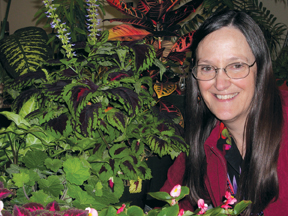Plants Make Us Better, More Civil People
Virginia Lohr ’73 has a simple message about the wide-ranging benefits of indoor plants
 The lush leaves in hues of gold, green, and burgundy that fill Virginia Lohr’s [’73] office at Washington State University–Pullman (WSU) have not been gathered for aesthetic purposes. Lohr surrounds herself with 14 potted plants because she knows from her own research, and that of colleagues in the fields of horticulture, landscape architecture, and psychology, that the plants will refresh the air in her space and improve the quality of her life in intangible ways.
The lush leaves in hues of gold, green, and burgundy that fill Virginia Lohr’s [’73] office at Washington State University–Pullman (WSU) have not been gathered for aesthetic purposes. Lohr surrounds herself with 14 potted plants because she knows from her own research, and that of colleagues in the fields of horticulture, landscape architecture, and psychology, that the plants will refresh the air in her space and improve the quality of her life in intangible ways.
Lohr’s work has a simple message: from better air quality and reduced stress to increased productivity, calmness, and tolerance to pain, indoor plants offer people wide-ranging benefits. A professor in the Department of Horticulture and Landscape Architecture, she talks often about the wide-ranging benefits of plants at international professional meetings as well as in the locally WSU-produced video The Civilizing Nature of Plants.
Her first study—conducted in a computer lab at WSU—looked at the physical effects plants have on air quality. The study addressed the concerns of WSU computer technologists who feared that dust generated by the plants would cause hard drives to crash. A productivity study was conducted simultaneously. Lohr’s research demonstrated not only that plants improve air quality but also that people were more productive and their blood pressure was lower in a room filled with plants.
Lohr’s interest in horticulture began while she was an undergraduate psychology major. By the time she had settled on the field following a leave of absence, it was too late to switch majors without extending her time at Swarthmore. Instead, she took as many botany courses as she could during that year. While earning a master’s in horticulture at New Mexico State University and a doctorate in plant and soil science at the University of Tennessee, Lohr realized she had brought psychology into her work after all with her interest in how plants affect humans.
In a subsequent study, Lohr and colleague Caroline Pearson-Mims, a research technologist at Washington State, found that the presence of plants could also ease pain. Subjects asked to leave their hands in ice water until it was uncomfortable were able to do so longer when they were in a room with plants compared to when they were in a plantless room or a room with colorful non-plant objects.
Concerned with increasing worldwide urbanization and reduced childhood contact with nature, Lohr and Pearson-Mims asked 2,004 adults in the 50 largest cities in mainland United States about their exposure to trees as children and what they thought of trees as adults. The survey yielded evidence that it is critical to have trees in cities so that kids have opportunities to interact with them. “People have innately positive responses when looking at trees—they feel happier and more relaxed in the environment,” Lohr explains, “and the response is magnified when the tree is green and has a spreading form.”
“Other peoples’ studies have astounded me,” Lohr says. “They have proven that the cognitive function of elementary school kids increases when plants are present and that violence among impoverished kids is reduced when plants are around their homes.”
In her landscape and environmental horticulture classes, Lohr incorporates details about the positive effects of plants on humans. “When it is exam time and my students are stressed out,” Lohr says, “I tell them to go hug a tree. On exam days, I bring a plant to class to ease their stress.”
Last year, Lohr was selected to be a member of WSU’s President’s Teaching Academy—an initiative to advance scholarship about teaching and learning. According to Chuck Munson, chair of the academy, she was chosen for her outstanding work as a teacher and educational scholar. “The proudest moment of my career,” she says, “was when the students learned of my selection to the academy and applauded me.”
Lohr was the Scott Arboretum’s first intern, and today, as a member of the WSU arboretum and wildlife center implementation committee, she is working to bring an arboretum to that university.
“Plants humanize our surroundings,” Lohr says. “They make us better, more civil people.”
 Email This Page
Email This Page